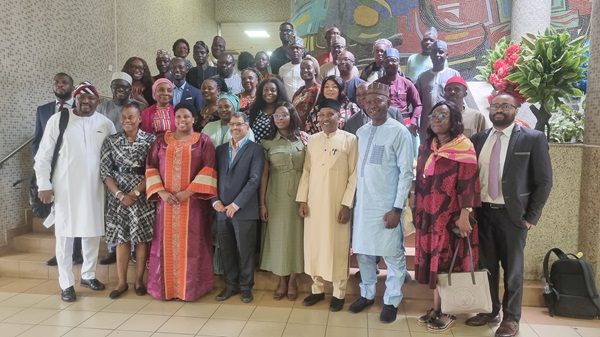
With the countdown to COP30 in Brazil intensifying, Nigeria is ramping up efforts to finalise its third Nationally Determined Contribution (NDC 3.0), a crucial component of the country’s climate commitments under the Paris Agreement.
At a high-level meeting of the NDC Steering Committee held in Abuja, director-general and chief executive officer of the National Council on Climate Change Secretariat (NCCCS), Dr. Nkiruka Maduekwe reaffirmed Nigeria’s resolve to submit a nationally led and inclusive NDC document ahead of the September 2025 deadline.
“The idea is to ensure that the Nationally Determined Contribution (NDC 3.0) under the Paris Agreement is a nationally led process,” Maduekwe told Science Nigeria in an exclusive interview. “The ministries must own the implementation of this document once it is adopted.”
The NDC Steering Committee, which includes representatives from federal ministries, civil society, the private sector, academia, and the media, plays a pivotal role in coordinating Nigeria’s national climate response. The Abuja meeting reviewed progress made through technical and consultative processes while validating the next steps in line with the global stocktake expectations under the Paris Agreement.
Nigeria’s last NDC, updated in July 2021, committed to cutting greenhouse gas emissions by 20 per cent unconditionally and up to 47 per cent with international support by 2030, compared to a business-as-usual scenario. With NDC 3.0, the government is aiming to raise its ambition further, extending the target period to 2035 and aligning the plan with current climate science.
According to technical reviews, Nigeria has assessed over 80 national development and policy documents across sectors such as energy, agriculture, land use, waste and industry. In May 2025, a nationwide series of regional and sectoral stakeholder consultations were held to incorporate the voices of local communities, youth, women, persons with disabilities and subnational actors.
“This is not a top-down process,” Maduekwe said. “From local governments to federal institutions, we are ensuring that everyone’s voice helps shape our climate future.”
The forthcoming NDC 3.0 will align with the most recent global stocktake findings, which call for a 43 per cent reduction in global emissions by 2030 and 60 per cent by 2035 from 2019 levels. For Nigeria, this means stepping up climate action across key sectors.
In her presentation, the Nigeria’s NDC team lead, Chioma Amudi, said the planned mitigation measures include phasing out fuelwood and charcoal for cooking, deploying carbon capture technology in cement manufacturing, increasing the adoption of electric vehicles, and expanding renewable energy through solar, hydro and biofuel infrastructure. Nigeria also intends to scale up hydrogen fuel use and improve waste management through wastewater treatment and composting initiatives.
“On adaptation, NDC 3.0 integrates priorities from Nigeria’s Adaptation Communication (ADCOM), focusing on seven core sectors: agriculture, health, water and sanitation, ecosystems, infrastructure, livelihoods and cultural heritage. These will help build climate resilience through improved access to water, more sustainable food systems, biodiversity conservation and reduced vulnerability to extreme weather and disease.
“The NCCCS has outlined a clear timeline to finalise the updated NDC. By early July, cost estimates will be completed, followed by the preparation of the first draft by mid-July. Technical and high-level validation workshops are scheduled for July 22 and July 24, respectively.
“Once approved by the Federal Executive Council, the document will be submitted to the United Nations Framework Convention on Climate Change (UNFCCC) before the September deadline,” she said.
Amudi added that robust emissions modelling underpins the targets, with projections indicating that emissions from energy, agriculture, and waste could drop by over 334 million tonnes of CO₂ equivalent by 2035 under the “maximum ambition” scenario. However, full implementation will require significant political will, international support, and investment, estimated at more than $170 billion.
Nigeria’s climate policy journey began in 2015 with the submission of its Intended Nationally Determined Contribution (INDC), which aimed for a 20 per cent reduction in emissions unconditionally and up to 45 per cent with external assistance.
The 2021 update enhanced the ambition to 47 per cent with support, expanded the scope to include the waste and water sectors, introduced methane targets and committed to greener transport and agriculture.
That same year, the passage of the Climate Change Act provided a legal backbone for climate governance. It created the NCCCS and established a climate finance fund to mobilise domestic and international resources, such as green bonds, donor grants, and carbon taxes, to support NDC implementation.
Under the Paris Agreement, every country must submit updated NDCs every five years. These documents represent each nation’s blueprint for addressing climate change and with every update, ambition is expected to increase.
For Nigeria, NDC 3.0 is more than just a policy document – it is a strategy for sustainable development and resilience. With increasing climate risks affecting agriculture, water availability and public health, the stakes are high.
“Our NDC must reflect who we are, what we need, and where we want to go,” Maduekwe said. “It is not only about emissions – it is about protecting lives, securing livelihoods and building an inclusive future.”
As COP30 approaches, Nigeria is positioning itself not just to meet global climate goals but to lead the region in turning climate ambition into tangible development outcomes.

